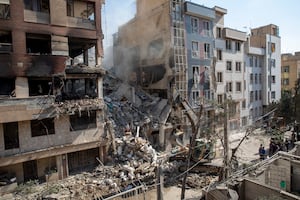Less than a month ago in Tehran, senior Iranian diplomats engaged foreign journalists and analysts with a clear message: Iran sought dialogue, not confrontation. It wanted better relations with its Middle Eastern neighbours, they said, and, under the right conditions, with western nations with which it had long been at odds.
There was some optimism – albeit very cautious – about the prospects of reaching an agreement with the US for limitations on its nuclear programme in exchange for much-needed sanctions relief.
Senior officials past and present stressed that Iran and its neighbours needed to look at what was possible, rather than be constantly on the look out for perils.
“One of my criticisms of my own country is that we have to depart from a threat-based perspective,” one former senior official said in a background briefing. “We want an opportunity-based outlook, not a threat-based outlook.”
In a glossy cobalt blue book of essays that accompanied the Tehran Dialogue Forum, a conference held by an Iranian Foreign Ministry-affiliated think tank, former Foreign Minister Ali Akbar Salehi argued that US President Donald Trump was hesitant to drag the US into more wars. Saber-rattling would keep Iran on its toes and strengthen Washington’s negotiating position “without actually unleashing a ruinous conflict”, Mr Salehi wrote.

Iranian officials attempted to emphasise diplomacy, knowing well that Israel favoured military options, and the US had threatened action should nuclear talks collapse. In the following weeks, Iranian officials and observers made clear that they believed Israel wanted to strike, and that any attack could not take place without US knowledge and backing.
“We will immediately respond to the Zionist regime's possible attack on the country's nuclear facilities,” Iran’s Supreme National Security Council said in a statement last week, before the Israeli strikes began.

Iranian officials and analysts did not expect an attack to happen while there were active plans for more negotiations. US and Iranian officials have been planning to meet for a sixth round of discussions in the Omani capital Muscat on Sunday.
“We were in a limited negotiation process and did not expect military [action],” a senior Iranian government foreign policy researcher told The National on Friday. “In fact, the Israeli regime sabotaged the diplomacy entirely with military action.”
Hassan Ahmadian, assistant professor of West Asian Studies at the University of Tehran, said that “Israeli warmongering against Iran was obvious and so the attack was never ruled out at any point”.
“Yet many in Iran believed that now the US had chosen dialogue with Tehran, it wouldn’t unleash the Israelis against it,” he told The National.
That moment came quicker than expected, though. For many in Iran, diplomatic talks have not yet failed, although they were facing significant headwinds over differing stances in Tehran’s rights to uranium enrichment. President Trump appeared to justify Israel’s attacks, which he later said took place with Washington’s knowledge, by noting that a 60-day deadline he had imposed for nuclear talks to succeed had ended on Thursday.
Some observers argue that Iran miscalculated the time it had available for negotiations, and Israel’s willingness to really go through with an attack.
In Tehran, however, many believe Israel miscalculated too, encouraged by what they see as international inertia over its bombing campaigns in Palestine, Lebanon and Syria. And because of the perception of US complicity, Washington is being held responsible as well.
“It's not about underestimating [Israel],” the government foreign policy researcher said. “The point is that we were in a diplomatic process and we expected the other side to respect this joint diplomatic effort.”
The US president was swayed from diplomacy to not saying no to military action, Iranian officials believe.
Influence of, "Zionist lobbies" on the US government and "extremists" in US decision-making frameworks "should be considered the reason for this change in approach and finally, Israel carried out this attack," a second senior Iranian government official told The National.
Israel’s multipronged attack on Iran’s nuclear and defence infrastructure has dramatically changed the playing field.
As it pledged, Iran has responded, and there is room for further escalation if the exchange of strikes and counterstrikes continues. It has named its continuing strikes against Israel as “Operation True Promise 3”, linking it to previous operations of the same name on the country.
Unlike past responses, which carefully balanced force with restraint to avoid spiraling escalation, such caution may now be less of a priority.

“Iran’s response cannot be similar to what happened in October or April 2024,” a regional source close to Iranian thinking and military circles, told The National. “The proportionate retaliation must be strong enough to deter further Israeli aggression.”
The escalation has endangered both the possibility of nuclear talks continuing and the likelihood of them succeeding, even if they resume. Iran’s position on attending the negotiations scheduled for Sunday is unclear, its Foreign Ministry spokesman said on Saturday. The framework of thinking in Iran is shifting from diplomacy to war, observers believe.
“I suspect it’s [Iran’s] preferred diplomatic approach not to go ahead in parallel with the continuing military confrontation with Israel,” said Mr Ahmadian. “And so, it’s war now – diplomacy can only come afterwards.”



